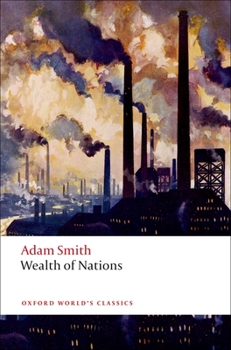Wealth of Nations
Select Format
Select Condition 
Book Overview
While it has been pointed to time and again by governments and pundits promoting laissez-faire economics, The Wealth of Nations actually shows that Adam Smith viewed capitalism with a deep suspicion, and tempered his celebration of a self-regulating market with a darker vision of the dehumanizing potential of a profit-oriented society. Smith did not write an economics textbook, but rather a panoramic narrative about the struggle for individual liberty and general prosperity in history. This edition includes generous selections from all five books of The Wealth of Nations. It also provides full notes and a commentary that places Smith's work within a rich interdisciplinary context. About the Series: For over 100 years Oxford World's Classics has made available the broadest spectrum of literature from around the globe. Each affordable volume reflects Oxford's commitment to scholarship, providing the most accurate text plus a wealth of other valuable features, including expert introductions by leading authorities, voluminous notes to clarify the text, up-to-date bibliographies for further study, and much more.
Format:Paperback
Language:English
ISBN:0199535922
ISBN13:9780199535927
Release Date:May 2008
Publisher:Oxford University Press
Length:688 Pages
Weight:1.06 lbs.
Dimensions:1.3" x 5.1" x 7.8"
Customer Reviews
1 rating
Economics, history, and life are not individual subjects.
Published by bernie4444 , 3 months ago
All my life, I’ve been bombarded with one economist versus another. Each time, Adam Smith always showed up. So, after hearing snippets of his book and his ideas over and over and over again, I thought, “Ah, I know Adam Smith.”
Well, I might’ve been a tad premature in thinking that I knew Adam Smith. As you will, too, when you read this book, “An Inquiry into the Nature and Causes of the Wealth of Nations.” Sometimes split into volumes. Some are abridged (avoid these). There are different commentators and editors.
I figured that it was finally time to read Adam Smith for myself instead of taking snippets out of context.
At first, I began to think that I had made a big mistake. If you read the Constitution of the United States, then you would notice that you are always told the impressive parts as separate statements, and they leave out all the boring details and sometimes important minutiae. Well, it looks like they did the same thing to poor Adam.
On the surface, as you start reading this book, you start to wonder what makes Adam Smith so important, as it seems so primitive. Reading on, you realize that he came from an era that was way before the information age. His samples seem primitive and simple. He repeats and repeats and repeats himself. You start to wonder if this is the same Adam Smith that you studied in school.
You will want to hang in there, though, as soon as you realize that Adam Smith had to start with the fundamentals of history and primitive economics. After pages of history, he will finally get to his time.
Yes, this book is ancient, and the examples are not usually relevant today. However, just as you decide that you made a horrible mistake in reading “An Inquiry into the Nature and Causes of the Wealth of Nations,” small jewels of insight into not only economics and history but life itself reveal themselves in his everyday descriptions and observations.
I had to buy a book on the English poor laws as the aforementioned as everybody knew about them. Many other subjects and reference books all of a sudden appeared on my desk as I realized that with all the depth of Adam Smith, this is just the tip of the iceberg.
Yes, sometimes Smith can get boring and very redundant. However, whatever you do, do not skip any pages. Just as soon as you know what he is going to say, he comes up with another interesting angle.
He not only covers economics from his version of a practical view, but soon he covers the history of education and many other subjects besides commerce. I found that he covers the effect of religions on people and people on religions. He covers schools and how they got started, and their potential for modifying society. He covers the economics of war and other major world-changing phenomena.
Just as you think he is talking about his world and his time. You pick up a newspaper and see the very same type of events and economic arguments.
For me, of all things, I was able to get a new view of the national debt, and it changed my view from a necessary evil to an excellent opportunity.
You, too, will find new insights or views on economics that you were already sure you had under your belt.
So, enjoy reading Adam Smith not as a necessity but for the fun of getting new views directly from the author.





